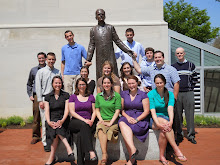Wednesday, December 31, 2014
What is freedom?
Is
there any other word that defines the American spirit quite like the word
freedom? Ask most people what they understand freedom to be and you’ll hear a response resembling the following:
freedom from coercion, oppression, and extrinsic force so that one may exercise
the ability to make choices and determine their own path of life. Any
limitation placed on the choices available to a person is, by definition, a
loss of freedom.
While
all of this is true, it is an incomplete understanding of freedom, it resembles
more the idea of liberty, which is a part of a the full concept of freedom. To
understand freedom more completely, one must explore two senses of freedom and
how they relate to one another.
 |
| Mike Mozart, "American Flag" is licensed under CC 2.0. |
The
second sense, however, can be described as freedom for. In this sense
freedom refers to an ability or a power. One is free to perform an action
because she has the ability or the power to perform that action. A classic
example would be the freedom to play an instrument. Having never learned to
play the piano, I do not have the freedom to sit down at a moment’s notice and produce music. The most I can do
is awkwardly press a few keys and produce the first few notes of a simple song.
One who has learned to play the piano has the freedom to sit down at any keyboard
they come across and produce music for all within ear shot. This is a fuller
understanding of freedom and liberty only exists in service to this second
sense of freedom. The first sense is merely potentiality, the second,
actuality.
In
addition, once someone makes a choice, they automatically reduce their liberty.
If I choose chocolate ice cream, I necessarily no longer have the liberty to
choose the vanilla. If I turn right down the road, I no longer have the liberty
to turn left. In contrast, freedom in the second sense is never diminished. It
always actualizes potential, it fulfills. This being said, to achieve freedom,
one must always sacrifice one's liberty. If I want to produce music from the
piano, I am not at liberty to bang down on any key I choose at any moment. The
piano has a law and an order that I must submit to if I wish to be truly
free to play the piano. In addition to laying aside my liberty in service to
this internal structure that must be obeyed, I must sacrifice my liberty
continually to practice and play scales over and over when I’d rather play or do something else. This
constant sacrificing of my liberty gradually transforms into the freedom to
produce the beauty of the music — to achieve the purpose for the piano’s existence. Freedom, then, can be described
as the ability achieve excellence - to fulfill the purpose of a particular
object or power.
These
two senses of freedom are dependent upon each other. I cannot exercise the “freedom for” without the “freedom from.” If someone has bound my hands, I am not free
to play the piano. The first sense is in service to the second. Liberty is not
an end in itself. It exists always in service to freedom. The goal, then?
Instead of understanding mere liberty as the primary virtue to be sought for
oneself, one should seek to use their liberty to achieve excellence and
fulfillment.
Subscribe to:
Post Comments
(
Atom
)
















No comments :
Post a Comment
We would love to hear from you! Please keep comments respectful and relevant to the topic at hand.